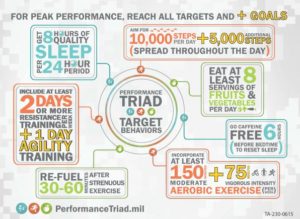
By Jessica Marie Ryan
Chievres Air Base, Belgium
In parts of Europe, like Belgium and Germany, weather does not have the best reputation. Gray skies, rain and clouds can cause dark, dreary days, especially as temperatures continue to cool down and sunsets start earlier during the winter months.
The lack of sunlight can have harmful effects on the human body. One affect is vitamin D deficiency, which can prevent people from staying healthy as their nervous, muscle and immune systems are impacted.
WHAT IS VITAMIN D?
According to the National Institutes of Health, vitamin D is a fat-soluble vitamin. It is naturally present in a very few foods, sometimes fortified in certain foods or available as a dietary supplement. People can also produce vitamin D naturally after direct exposure to sunlight, landing its nickname the “sunshine vitamin.”
Getting enough vitamin D is important, since it promotes and regulates the absorption of calcium and phosphorus as well as facilitates in normal functioning of the immune system. In addition, vitamin D has other roles in the body, such as the modulation of cell growth, neuromuscular function and reduction of inflammation. Vitamin D also helps protect people from getting diseases such as osteoporosis and rickets.
While severe vitamin D deficiency cases, such as getting rickets, are rare today, people can still get symptoms.
“Symptoms and problems which are well-documented from significant vitamin D deficiency can include bone discomfort in the low back or legs, increased risk of falls and possibly fractures and muscle aches. Sometimes, these symptoms can be incorrectly correlated to fibromyalgia, chronic fatigue syndrome or arthritis,” said Army Maj. Mark Jeffords, the chief medical officer at the SHAPE Healthcare Facility. “Replacement often corrects those symptoms.”
DEFICIENCY PREVENTION
One way of getting vitamin D is through either consuming certain foods or taking dietary supplements.
Certain foods naturally have some vitamin D, such as egg yolks, mushrooms, cheese, beef liver and fatty fish like salmon, tuna and mackerel. Fortified foods, like Jeffords mentioned, include milk, breakfast cereals, orange juice, soy drinks and other dairy products like yogurt.
In addition, people can also take dietary supplements, which can be found in multivitamin pills or by itself in the form of D3 (cholecalciferol).
Jeffords recommends supplementation for all adults, especially during the winter.
“The daily dose of vitamin D recommended for healthy adults with normal sun exposure is 400 IU (international units) of vitamin D3 (cholecalciferol) per day and 600 IU if [experiencing] inadequate sun exposure,” said Jeffords. “In Belgium, I typically recommend 800-1,000 IU daily for healthy adults. Prescription doses of vitamin D are available to treat true vitamin D deficiency.”
However, Jeffords added consuming too much vitamin D is harmful.
“If you plan to take more than 1,000 IU daily, please discuss with your medical provider first about testing and appropriate replacement,” he added.
A HOLISTIC APPROACH
Direct exposure to sunlight is another way people can get vitamin D as the body forms the “sunshine vitamin” when ultraviolet rays from sunlight strike the skin and trigger vitamin D synthesis, according to the NIH.
“Humans typically obtain 90 percent of vitamin D from production in the skin in response to sunlight,” said Jeffords. “Such production is nearly negligible in the winter in temperate areas.”
During these times, people can put enhanced lighting in their home and use light therapy methods.
“Many commercial devices are available either for dawn simulation or bright light therapy and deliver a safe, predictable intensity of light which can be used 30 to 60 minutes per day. These light boxes have demonstrated excellent mood improvement in multiple studies,” said Jeffords.

While these methods can help people fight the symptoms of vitamin D deficiency, people should incorporate simple measures to improve their overall well-being, especially during the winter time.
“A focus on the Performance Triad of seven to eight hours of good sleep per night, a diet rich in fruits and vegetables, and 150 minutes of aerobic exercise per week will go a long way to maintaining physical and mental health during this time,” said Jeffords.
However, if people are still experiencing issues with their health, Jeffords recommends to seek medical help as simple measures may not be enough.
“If you do experience concerning physical or behavioral health symptoms, please schedule an appointment with your primary care provider for a professional evaluation and diagnosis,” he said.
To schedule an appointment with a medical provider at the Stuttgart Health Clinic, contact 06371-9464-2900.
